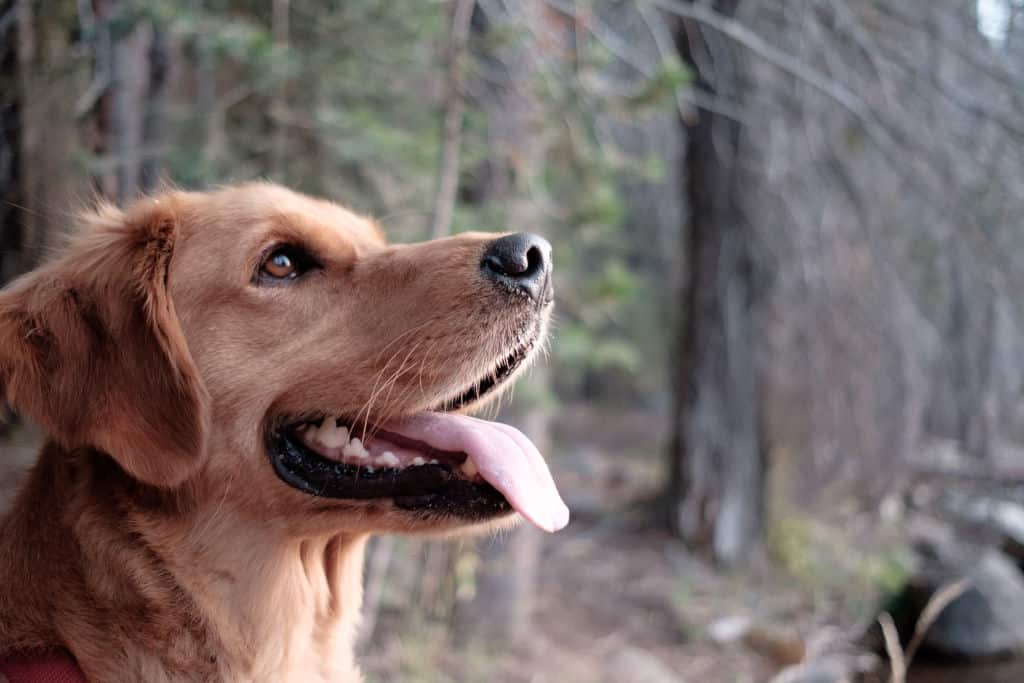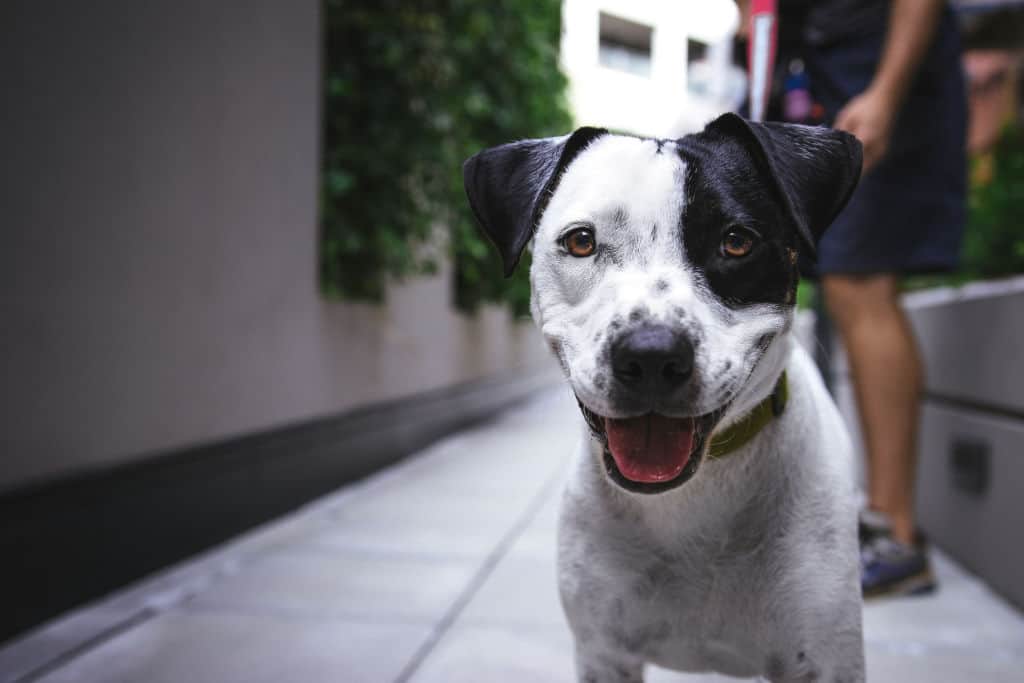There is an old saying that dogs think we’re gods, and cats think they’re gods. But is that true? Do dogs think we’re gods?
Our dogs are unlikely to be intelligent enough to form the concept of a god. Dogs lack a large prefrontal cortex, the part of the brain responsible for asking abstract questions like this. Their ability to think about the past or the future is pretty limited, so it’s unlikely they can think of a god.
They do seem to think highly of us, though. You could argue that if the dog was intelligent enough to understand the concept of a “god,” they might regard us as such. Or would they?

Do Dogs Think Humans Are Gods?
Even though little is known about canine cognition or whether they are spiritually sensitive, they are unlikely to have a concept of God, due to lack of ability to comprehend such a concept.
Therefore, our dogs don’t think of us as gods because they likely can’t understand what a “god” is. The idea of God is most likely unique to humans.
Pets understand that humans must eat, sleep, and use the restroom. From our perspective, these recognizable actions make us more similar to them than the sacred distance we typically associate with worship. This is still coming from our own point of view, though.
I, for one, care and love those who care and love me. I believe dogs are the same. Dogs not only appear to love us back, but they also regard us as family.
You could argue that it is similar to magic to them. Nonetheless, I doubt they are curious. Dogs live in the moment, which is why they accept things as they are.
While humans often search for higher meanings, attributing deity-like statuses to the unknown, dogs’ perceptions are grounded in their direct experiences with us. This natural simplicity may explain why they never seem to hold grudges.
Scientific studies have shown that when dogs gaze into our eyes, their brains release oxytocin, the same hormone that strengthens maternal bonds in humans. This biochemical reaction hints that our bond transcends mere companionship; it’s deep-rooted and emotionally charged.
The most honest thing we can claim is that, since dogs cannot communicate by language, we can only speculate about how they perceive us and what we mean to them. Once thing is certain: they surely think highly of us.
Do Dogs Think We Are Also Dogs?
To answer this question, we must distinguish between owners and other people and how dogs react to both concepts.
Dogs appear to recognize that other humans (non-owners) aren’t dogs. If you take your dog for a walk, you will see this. When they pass people, they barely notice them, but if another dog comes along, your dog will most likely be more interested in them.
Regarding owners, dogs seem to look at us as part of the pack or family. If you were taking your dog for a walk and they happened to see someone they knew well, they might show great interest in the human and run to greet them.
This does not imply that the dogs regard them as other dogs but rather that they recognize the humans in their “group.”
Because they are pack animals, they may accept us as a pack member. However, it is equally likely that they do so without understanding that we are not dogs but humans.
To add to that argument, dogs may react differently to other dogs because their primary sense is smell. We know the sense of smell is highly important for them. They may behave differently towards them because other dogs smell far more appealing to them than humans, whether they realize it or not.
Intriguingly, when dogs playfully steal our belongings or bring us their favorite toy, they’re not just seeking attention. They’re also showing a sense of shared property or mutual interests, highlighting that they perceive us as more than just caretakers.

However, I think dogs are exceptionally good at distinguishing between humans and dogs.
Dogs are intelligent creatures with distinct qualities. You get a wide range of personalities and behaviors, just like humans. However, dogs interact with other dogs very differently than humans, cats, or anything else. The only question is whether they are aware of this.
Cognitive studies on canine behavior indicate that dogs can differentiate between human faces, showing a preference for their owner’s face. This ability to recognize individual humans shows they understand the distinct role we play in their lives, apart from the larger world of dogs and other animals.
I strongly believe your dog will never confuse you for another dog, but it’s difficult to tell how aware they are that we’re not dogs.
Do Dogs Think of Us as Their Parents?
It depends on how you treat them, but with my dog, it feels more like a friend/parent relationship than anything else.
Working dogs may also have feelings of “coworkers” thrown in there. We’ll never know what they think of us because we can’t ask them, but they greatly like us.
Dogs have been selectively bred to be human-friendly. They mostly see their owners as pack mates or companions, but it will depend on how they’re raised and treated.
How Do Dogs See Humans?
Dogs are pack animals that thrive in groups. Keeping this in mind, dogs will almost always regard you as a pack member. Because the alpha theory is mostly debunked, they will likely consider you as a pack friend rather than a pack leader.
They also have a strong sense of familial bonding, which causes them to care for and protect one another. And they most likely consider themselves members of the human family that is adopting them.
Although some dogs may “appear” ungrateful, others sometimes regard their owner as the center of the universe. He will try to walk like you and imitate your movements. Some pets will even have different walking styles to adapt to their owners.
However, dogs do not think abstractly because they lack language skills. Dogs feel and are very good at responding to those feelings, which is why they are so empathetic.
As pack animals, dogs have evolved a keen sense of group dynamics. When a dog leans on you or places a paw on your foot, it’s not only a sign of affection but also a subtle acknowledgment of your place in their social structure, a unique bond different from their relationships with other canines.
Service dogs are an excellent example. They are very sympathetic and, surprisingly, can read our feelings. They have emotions that allow them to approximate inarticulate love and connection, making them excellent companions.
Observing how a dog interacts with a statue or a picture of a human can give insights into their perception. They don’t worship these images or show reverence, indicating they don’t see us in a divine light but as tangible, interactive beings.
FAQs
Do dogs consider their owners Alphas?
In recent years, the “alpha theory” has been debunked. Domestic dogs appear to lack an alpha pack structure. Domestic dogs may respond differently to some people than others, but there is usually no such thing as Alpha.
How aware are dogs?
Dogs were initially considered non-self-aware because they failed the “mirror test.” However, because dogs are not visually oriented, a new test, the “sniff test of self-recognition,” was developed and demonstrated significant evidence of dog self-awareness.
Dogs are generally one of the more socially intelligent animals. They make human-like eye contact, uncommon in animals, and recognize your emotions. They also appear to understand pointing, whereas chimps do not. This makes them somewhat aware.
Do dogs think they are human?
Probably not, based on the results of the self-identification mirror tests. They most likely do not see themselves as dogs, either. On the other hand, dogs are unlikely to consider which category they belong to – they see us as family and rely on us for protection and affection.
Alex, a passionate animal lover, has experience in training and understanding animal behavior. As a proud pet parent to two dogs and three cats, he founded AnimalReport.net to share insights from animal experts and expand his knowledge of the animal kingdom.




